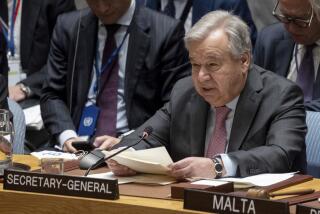U.N. boosts Palestinians’ status to nonmember observer state
- Share via
UNITED NATIONS -- The United Nations General Assembly voted Thursday to slightly enhance the status of the Palestinian territories at the international organization, a controversial gambit that conveys world recognition for beleaguered Palestinians.
Palestinian Authority President Mahmoud Abbas won 138 of the assembly’s 193 votes, including those of some key European states, for his proposal to have the territories’ standing upgraded to “nonmember observer state” from “nonmember observer entity.”
The new status theoretically opens the way for Palestinians to press their interests through U.N. organizations, but it remains unclear how aggressively Abbas will embrace a strategy that risks devastating financial retaliation from the United States and Israel.
Abbas, the leader of the secular Fatah faction in the West Bank, laid out his plan with ringing declarations for the rights of Palestinians -- who ultimately want an independent Palestinian state -- but with little hint of how far he intends to go.
The assembly was being asked “to issue a birth certificate to the reality of the state of Palestine,” said Abbas, who received two standing ovations.
The United States and Israel voted against the proposal. But some European countries -- including France, Spain, Portugal and the Scandinavian states -- voted in favor of it. Britain, Germany and the Netherlands abstained.
The United States, Europe and Israel hope Abbas, a longtime proponent of direct negotiations with Israel, will reengage in a U.S.-sponsored peace process.
The European governments, while skeptical in some cases of the benefits of the new status for the Palestinian territories, believe that Abbas’ moderate faction needs visible world support for pursuing a nonviolent approach at a time when its rival -- the Islamist militant movement Hamas in the Gaza Strip -- has won new diplomatic importance and domestic support after attacking Israel with thousands of rockets.
In its eight-day conflict with Israel this month, Hamas was courted by Islamic and other world leaders, while Abbas was largely ignored.
The United States and Israel played down the importance of the U.N. change in status and portrayed it as a hollow symbolic gesture. Although they have fought the proposal for two years, they can’t afford the collapse of Abbas’ government because they would be left to deal with Hamas, which they have formally designated as a terrorist organization.
The vote “will change nothing on the ground,” Israeli Prime Minister Benjamin Netanyahu said in Jerusalem, where the vote was greeted with a combination of dismissal and derision. He said the resolution “doesn’t advance peace, it pushes it backward.”
“UNGA resolutions are not worth the paper they’re written on,” Deputy Prime Minister Danny Ayalon told Israel Radio. Israeli officials sought to win over key European officials on the issue this fall, but their campaign fell short.
Israeli officials warned they would react strongly if Abbas moved, for example, to try to charge Israeli officials in the International Criminal Court.
Israeli officials also said this week they might temporarily withhold tax revenue transfers to recoup about $180 million in unpaid electricity bills, but that more punitive steps would be postponed.
U.S. officials, including Deputy Secretary of State William J. Burns, met with Abbas on Wednesday in New York to urge him again not to use the new status to begin a fight with Israel that could backfire with devastating results.
Reaction in the U.S. Congress may be less measured.
U.S. lawmakers have held up more than $200 million in aid to the authority because of questions about the U.N. proposal and Fatah’s possible reconciliation with Hamas.
On Wednesday, GOP senators entered amendments to the pending defense bill that could cut off funding to the Palestinian Authority and to countries that support the Palestinian bid, and totally defund the United Nations.
“There must be consequences for their rejectionism and continued irresponsibility,” said Rep. Ileana Ros-Lehtinen (R-Fla.), chair of the House Foreign Affairs Committee.
Still, aides said lawmakers might be persuaded to hold back if Israeli officials urged them not to take a step that could bring the collapse of the government in the West Bank.
ALSO:
Roadside bomb in Afghanistan kills 10 civilians
Iran blogger’s death in prison sets off blame game
British judge urges new press regulator due to hacking scandal
Times staff writer Edmund Sanders in Jerusalem contributed to this report.
More to Read
Sign up for Essential California
The most important California stories and recommendations in your inbox every morning.
You may occasionally receive promotional content from the Los Angeles Times.











